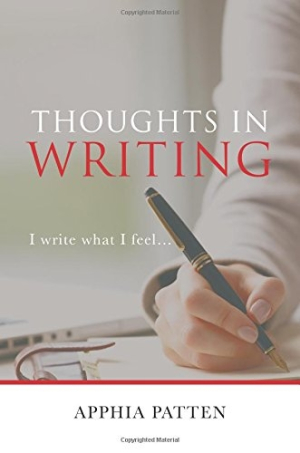Thoughts in Writing
I Write What I Feel....
Thoughts in Writing collects raw, exuberant poetry that speaks to the human condition with sincerity.
Apphia Patten’s Thoughts in Writing is a searching collection of poetry that plumbs the author’s ideas about life, love, religion, independence, and insecurity. Engaging poems delve deeply into personal issues while also exploring broad concerns common to all.
Unifying themes include the desire for comfort and stability, as expressed in “There’s got to be more… “, and the impassioned demand for respect exemplified in “Listen.”
The book compiles a series of intimate reflections on freedom, motherhood, gossip, truth, and men’s “MENy issues.” The work is candid and ruminative, often circling back to religious convictions, but without becoming preachy: for example, the narrator in “The Church Has Got It Wrong” laments that her church is stagnant, losing members and not as well-marketed as worldly pleasures.
Written in free verse and using straightforward language, Thoughts in Writing probes lofty philosophical questions, such as truth versus reality. It also examines day-to-day life, as with “Absence of Words,” which expresses the narrator’s frustration over how a long distance relationship feels dead end, and “Beauty, Misinterpreted,” which questions whether those complimenting the narrator see her for who she truly is.
The book charts dreams, aspirations, and insecurities in prose poetic form: “Because I’m afraid to feel, I conceal instead. / It’s easier. It’s safer.”
Poems typically run for a few pages, each serving as an extended rumination on a particular topic. They cover personal triumphs and disappointments, expressing acutely felt emotions like love, hate, and envy. They typically either unfold like well-constructed essays, as with the examination of what it means to be free in “Freedom,” or meander in a more naturalistic stream-of-consciousness way, as with the roundabout, waxing-rhapsodic “Sleep.”
Poems like “Only God” paint a lavishly detailed portrait of the narrator’s thought processes, showing how she overcame feelings of worthlessness, guilt, and suicidal thoughts. Language is impressively direct and honest, as with a description of “the wounds I obtained from walking a dark, lonely path on my own with so-called ‘friends’” in the poem “I Remember You.”
Rhetorical devices, especially repetition, are used to great effect, as in “Just because,” where eight consecutive sentences begin with the title phrase. With an improvised jazz quality, other poems riff on phrases, too, as in “It’s Your Fault”:
It’s your fault while I smile during the rain.
You’re the reason why I laugh through the pain.
You’re the reason why I stand at times when I should be on my face.
You’re the reason why I show love to everybody because it’s the same love.
Frequent autobiographical details are effectively used to ground poems in illustrative specifics—how the narrator would get out of school at 2:35 p.m. and not return home until 11 p.m.; how she never got to say goodbye to her grandmother. Raw emotions are presented without hesitation:
At work, act professional.
At home, act normal.
At school, act intelligent.
With friends, act responsible …
Life is a performance that we put on for strangers.
Thoughts in Writing showcases an interesting poetic voice and features sometimes unexpected wordplay. The book has a confessional tone and a conversational vibe, and poems like “On The Streets” would be effective if read as slam poetry, with lines like “Go to the streets and you’ll understand what I mean.”
Thoughts in Writing collects raw, exuberant poetry that speaks to the human condition with sincerity.
Reviewed by
Joseph S. Pete
Disclosure: This article is not an endorsement, but a review. The publisher of this book provided free copies of the book and paid a small fee to have their book reviewed by a professional reviewer. Foreword Reviews and Clarion Reviews make no guarantee that the publisher will receive a positive review. Foreword Magazine, Inc. is disclosing this in accordance with the Federal Trade Commission’s 16 CFR, Part 255.

